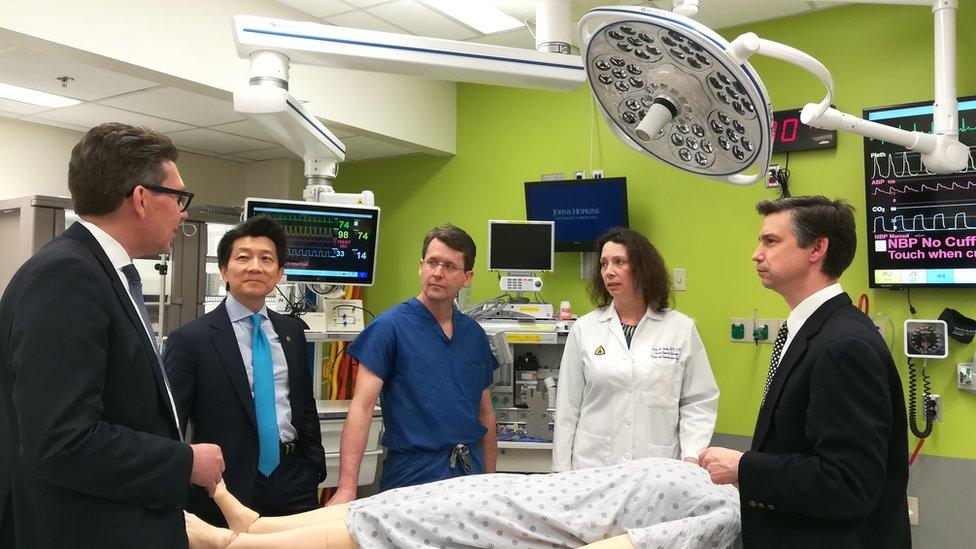US soldier gets world's first penis and scrotum transplant
- Published

Dr Andrew Lee (second from left) and his team at Johns Hopkins University
A team of US doctors has successfully carried out the world's first total transplant of a penis and scrotum.
Surgeons at Johns Hopkins University in Baltimore, Maryland, performed the operation on a soldier who had been wounded by a bomb in Afghanistan.
They used a penis, scrotum and partial abdominal wall transplanted from a deceased donor.
They say the soldier should be able to regain sexual function, which is impossible with penis reconstructions.
The team of 11 surgeons performed the transplant over 14 hours on 26 March.
It is the first surgery on a combat veteran injured on duty and the first to transplant a complete section of tissue including the scrotum and surrounding abdominal area.
Doctors said the donor testicles were not transplanted, due to ethical considerations.
"While extremity amputations are visible and resultant disability obvious," said Dr WP Andrew Lee, head of Plastic and Reconstructive Surgery at Johns Hopkins University, during a telebriefing on Monday, "some war injuries are hidden and their impact not widely appreciated by others."
Dr Lee called genitalia wounds an "unspoken injury of war".
"In a 2014 symposium co-sponsored by Johns Hopkins titled 'Intimacy After Injury', we heard from the spouses, families, and caregivers of these wounded warriors about the devastating impact of genitourinary injuries on their identity, self-esteem and intimate relationships," he said.
The soldier, who wishes to remain anonymous, said in a statement released by the university: "When I first woke up, I felt finally more normal like finally I'm okay now."
His injury was the result of stepping on a hidden bomb in Afghanistan.
In medical terms, the surgery is called a vascularised composite allotransplantation - which is all to say that the process involves transplanting skin, bone, muscles, tendons and blood vessels.
The Johns Hopkins Genital Transplant Program, which funded the surgery, has initially focused on post-traumatic cases, particularly injured soldiers, as their wounds generally make conventional options impossible.
Experts from the surgical team, external expect the soldier will be fully recovered in six to 12 months.
Dr Rick Redett, clinical director of the genitourinary transplant programme, said that the soldier is recovering well and is expected to be discharged from hospital this week.
"It is our hope that such a life enhancing transplant will allow him to regain urinary and sexual function and lead a more normal life," Dr Redett said. "It is also our goal to offer the procedure in the future to other suitable patients."
The transplant team also said that the university has approved 60 genital transplant surgeries as a part of the programme.
The first penis transplant in the US was in 2016 at Massachusetts General Hospital in Boston.
In 2014, South African surgeons performed the world's first successful penis transplant.